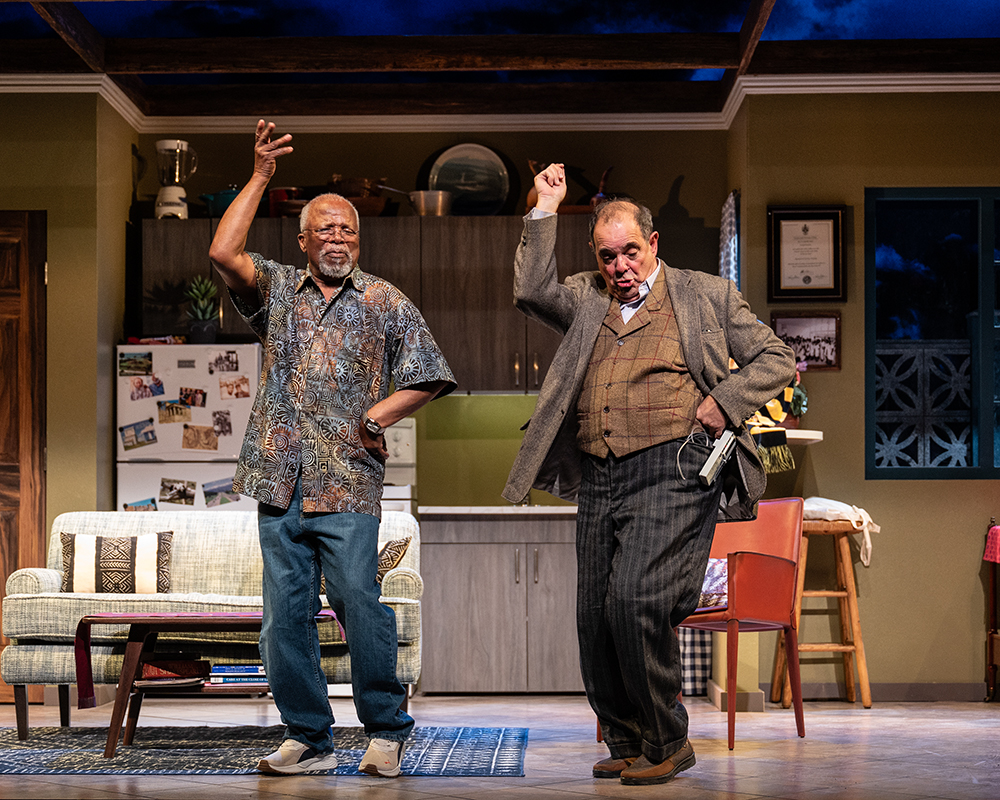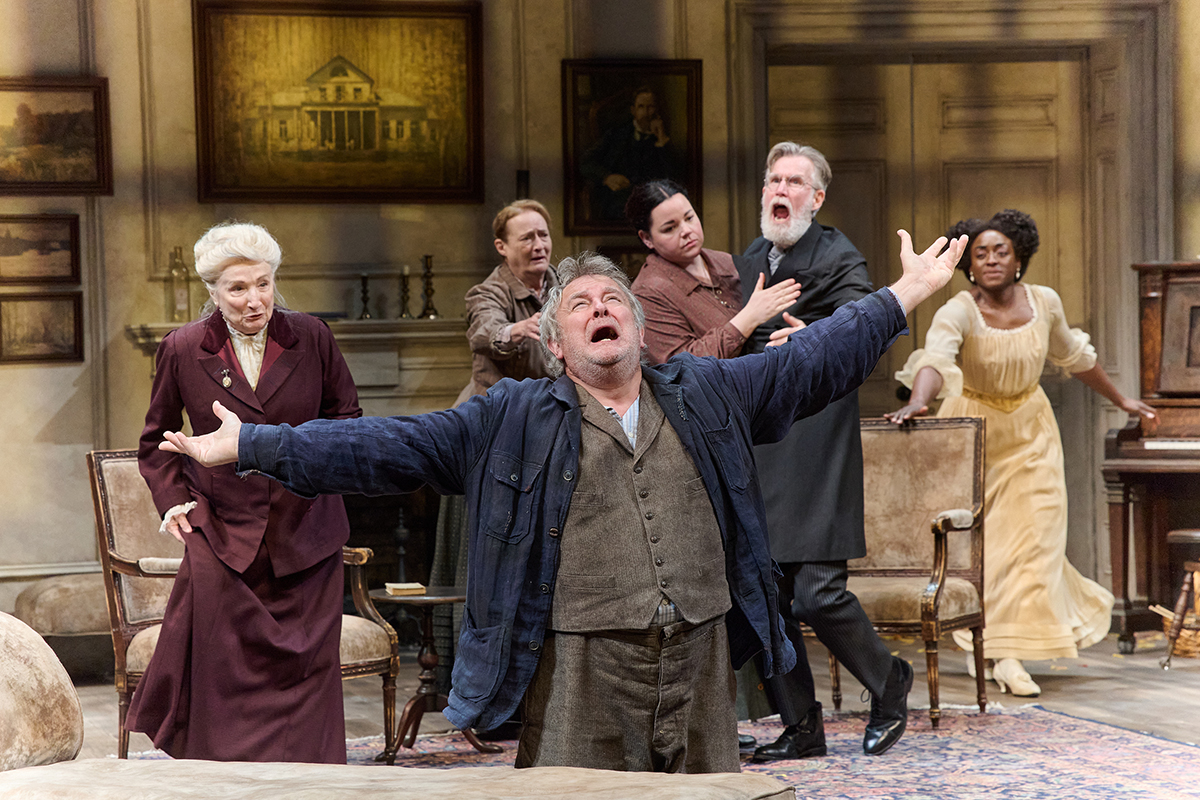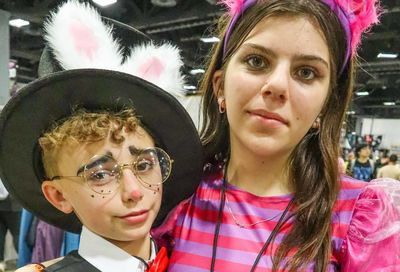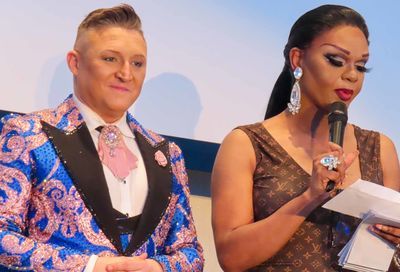Douglas Sills: Playing It Straight
Kiss Me, Kate's Douglas Sills is a gay leading man who relishes playing things straight

“West Side Story certainly has charm, but there’s no Shakespeare in it — it’s just a take off of Romeo and Juliet.”
Douglas Sills has good reason to criticize the famed musical — at least for its Bardian qualities. The actor is currently starring in Shakespeare Theatre Company’s production of Cole Porter’s Kiss Me Kate, a show so steeped in Shakespeare that the theater bills it as “American musical theater’s greatest tribute to the Bard.”
With entire scenes lifted from Shakespeare’s manuscripts, Kiss Me, Kate doesn’t so much reference The Taming of the Shrew as it does revel in it. So entrenched in its themes and farcical nature is Kate that celebrated 20th century poet W.H. Auden touted it as an improvement over Shakespeare’s original. That’s a tall act for any other Shakespeare-derived work to follow.
Shrew is retrograde in its views on women and gender roles. That’s not nearly as true with Kiss Me, Kate, whose two lead characters are divorced and presented on equal footing. It helps that a woman — Bella Spewack — co-wrote the book and a gay man (Porter) composed the music and lyrics. And those lyrics are “filthy, juicy, delicious,” as STC’s music director Doug Peck has put it — full of double-entendres when not directly sexual, and coming out of the mouths of the male but especially the female characters.
Kiss Me, Kate isn’t produced very often, according to the show’s director Alan Paul, because it requires a company of actors who are true “triple-threats” — those who can dance, sing and act. “Most importantly,” Paul writes in his Director’s Word in the program, “you need two actors of extraordinary depth and humor for Fred Graham and Lilli Vanessi. And they have to be great singers. And they have to be able to handle Shakespeare!”
Certainly, they’ve gotten exactly that with Sills, a classically trained actor born and educated in Michigan and a graduate of the American Conservatory Theater in California. Sills was even considered to play Fred when Kate was last revived on Broadway, though it was Brian Stokes Mitchell who would go on to win the Tony Award for that 1999 production. Finally given the opportunity to step into Fred Graham’s shoes — and codpiece — Sills plays opposite Christine Sherrill, whom he calls his “favorite diva” of the moment because she is “very facile with comedy and a has a very powerful voice.”
Sills has been playing leading roles on stage for two decades now, in shows including The Scarlet Pimpernel, Little Shop of Horrors and The Addams Family — and he has a theory about what “the secret” might be to his success as a gay man in that realm.
METRO WEEKLY: How is Kiss Me, Kate?
DOUGLAS SILLS: It’s a monster — we have everything from an amazing tap dance competition to bullwhips and intense fight sequences, major orchestral singing arrangements, big dance numbers, Shakespearean themes, big costume changes. It’s a bear!
It’s just so fun. It’s up there with my favorites, because the tunes are incredibly catchy, and the lyrics are Cole Porter at his finest. He is at the peak of his skills. And he’s showing off, too. I mean, it’s sort of like, you see one of those guys doing a lasso or lariat show in the middle of a rodeo — that’s what he’s doing with the words. He’s that good at wordplay. And tremendous sexual innuendo at every line. And maybe not innuendo — just direct, there’s nothing hidden about it sometimes. It’s just plain and right out there.
MW: Describe the show and especially how Taming of the Shrew factors into it.
SILLS: It’s a company of actors putting on a new musicalized version of Taming of the Shrew. You see the actors backstage, and then you get to see their show, that’s being put on. And it’s the first performance of the show. So things go wrong, and there’s relationship issues that are bleeding out onstage. You’re seeing the relationship between the two lead actors, Fred and Lilli, and how their relationship and their marital battle is playing out on stage under the guise of the Taming of the Shrew lead characters Kate and Petruchio. It’s a whole show-within-a-show and this sort of double meaning going on whenever there’s a Shakespeare scene or a Shakespeare fight sequence, where she’s beating the hell out of me. And that’s really the joy of watching it — it’s like that movie Mr. and Mrs. Smith with Angelina Jolie and Brad Pitt. Everybody who sees the movie knows that they’re married in real life. So when they’re battling, there’s an extra pleasure, sort of guilty, juicy pleasure — we’re watching a husband and wife.
MW: How does Kiss Me, Kate tackle the misogyny inherent in Taming of the Shrew?
SILLS: There are some issues that a lot of people have grappled with as they try to reconcile their fondness for Shakespeare — his intellect and his mastery — with what appears to be a subservient role that he’s preaching for women at the end. We have found our way through it, and we think it’s very much in line with what the writers intend. I think, like all marriages, the one who might appear to be wearing the pants, when they’re in public, is often not that one when the doors are closed. And anybody who has been in a long-term relationship knows that there’s give and take, otherwise you’re not going to make it. I think we’ve found our way through it. And we will continue to hunt out the nuance of how they find each other — and is she really bowing down to him at the end, or is she just pretending?
MW: So you’ve tried to quell any chauvinism?
SILLS: In fact I think it’s quite the opposite. I think it demonstrates the equality in the sexes and how they come together to form a whole — a kind of yin-yang. You know, they’re not identical, but they fit together well, if they’re communicating.
MW: Let’s talk about you. Given coming out is still a struggle for many actors, it’s impressive that you’ve been out for such a long time.
SILLS: Yeah, I’ve been out since the beginning of my career — I was never in. I think I was the first actor that let the Los Angeles Times do an interview in my home with my partner. Many, many years ago, when I was a young man.
MW: Are you still together?
SILLS: We recently split, about a year and a half ago. We were together for 20 years. We’re still friends — good friends. In fact, I just talked to him the other day, on the anniversary — 18 years — since my Broadway debut, which was in The Scarlet Pimpernel. So I called to reminisce with him.
We were together many times in D.C. We have friends here, we did a show at the Kennedy Center together here — the first national tour of The Secret Garden. And I’ve been to the Kennedy Center with four shows — A Little Night Music in the Sondheim Festival, the first national tour of Into The Woods, and The Addams Family more recently.
So yes, I’m single. I’ve been out for a long time. Been to the marches here. I can say I’m probably as philanthropic and political as they get about that kind of stuff.
MW: With the longevity and breadth of your career, it’s surprising that you weren’t sure you would become an actor.
SILLS: Well, I think like a lot of people, when I was leaving college, I thought, I’ll go to law school. And my dad caught me at a very key moment and said, “Listen, you can go to law school any time. If you want to give this acting thing a try, I think you should do it.” And that was really the nudge I needed. So I went to graduate school and proceeded to enroll for a master’s degree at a place in San Francisco called ACT — where I frankly hid the fact that I could sing, because I felt, right or wrong, that I would not be taken seriously as an actor if they knew I sang. I think there was a real bigotry about that, at that time anyway.
MW: Was acting part of your childhood growing up?
SILLS: A little bit. It wasn’t the thrust of my life, but I went to a summer camp for many years where they would do one musical a season. It was very brief, but I saw my brother and sisters doing stuff on stage there, and so I did it, too. And in high school, a little bit. But, while I loved it, I just couldn’t quite figure out how I was going to be doing it and make a living. I grew up at a time when The Tonight Show, every actor that would come on and sit there with Johnny Carson would say, “Don’t do it. If there’s anything else you think that could make you happy, do that. It’s a miserable career.” [Laughs.] So you know, I didn’t quite know how I was going to figure my way through it practically — financially and logistically. But here I am! It’s been pretty good to me.
MW: But it was your father who encouraged you to pursue acting?
SILLS: They both encouraged me. Everybody was very encouraging about it. But yeah, I think it was a real achievement for my parents — a badge of honor for them, as progressive Jewish suburban parents — that they did well enough that their children could pursue an artistic path if they had the ability and the interest. That was a mark of real achievement, to do something artistic or intellectual, in that community I think.
MW: As opposed to just being another lawyer.
SILLS: Or doctor. Or in the worst-case scenario, an accountant. [Laughs.] So I think to some degree they lived through me, and they enjoyed it. They’re both gone now, but they were both there when I was nominated for a Tony Award [for The Scarlet Pimpernel], they came to the Tony Awards that year. And it was an incredible experience.
MW: Was coming out a struggle for you?
SILLS: Yeah, it was a struggle for me. I was unsure. I sort of was ambisexual for a long time — meaning, sleeping with both. I was very nervous to come out to my folks. But in the end, it worked out okay. They were good people. It was a different time, so the fact that they came around as quickly as they did is a real credit to their spirit — their openness. I mean, it wasn’t right away. There wasn’t a sense of, “Oh, I don’t care, I love you no matter.” I think there was disappointment. And, “What is it?” You know, this was 1980, ’81. It was a very different time. This was pre-Making Love, pre-Will & Grace. Pre-everything. The only kinds of images of homosexuality that were out there were of rapists, and psychopaths and child molesters and miserable, drunk people.
MW: From Cruising to Boys in the Band.
SILLS: [Laughs.] Boys in the Band was tough to watch for me as a kid. That was very tough.
MW: It was tough to watch when I came out in the ’90s, too. I haven’t gone back to watch it since, so I don’t know if it would be easier now.
SILLS: I think it would be easier because we’re so far away from it, but the pain is still — to be in the middle of that, at that time, was not comforting. Not at all. I don’t think it was intended to be comforting. But it certainly wasn’t.
MW: So you kept your singing under wraps at first — but not because you were gay.
SILLS: Oh no, it was just because when I was going to get my master’s degree. This was a time of David Mamet and Sam Shepard. And there weren’t a lot of people crossing over the way there are now. There was no Neil Patrick Harris, there was no Kevin Kline, there was no Glenn Close or Patti LuPone. You were either a really serious actor, and tough as nails, or you were a singer, a musical theater person. And there wasn’t really, in people’s minds, a place to crossover. So I used to keep two different resumes. That’s how separate the worlds were. I really felt like, people who were looking at my resume for a straight play or a new play wouldn’t know the stuff that I had done. That’s how separate the worlds were back then in some ways. Certainly that’s not the case now. But yes, there was a time. But pretty quickly it becomes pragmatic, when you get out of graduate school — you realize, if you’re going to make a living, you’re going to be singing.
MW: And you do more singing than not these days.
SILLS: You know, it varies quite a bit. I think people come to me when they’re trying to refigure a role, or create something new. I just finished doing two straight plays in a row, right out of a musical, and then right back into another musical. And that’s exactly the career that I had hoped for. The last show I did was a Broadway play, a new comedy Living On Love — just a few months ago. And to go right into this musical, that’s exactly the kind of career that I had imagined and wanted for myself.
I don’t get asked to play a lot of Jewish guys, even though I’m Jewish. And I don’t get asked to play a lot of gay guys, even though I’m gay.
MW: Why do you think that is?
SILLS: It’s that stupid shit. I’ve had a long career, and I know — I’ve been told — I’ve lost parts because I’m out. Or I’m too gay — or not gay enough. Or he’s not Jewish enough — he doesn’t look like Woody Allen. You know, that’s just the nature of the beast. And I think for a long time, gay casting directors, there was a time I think they projected onto gay actors. I never had a problem getting straight roles when the casting director was a woman. But oftentimes, gay casting directors said, “Oh no, you know, he’s too gay.” But they were seeing themselves. There was self-loathing going on. They just thought, no, he can’t pass. Well, the women in the room never gave it a second thought. But you know, that’s all societal bullshit that we live with.
MW: And we still have it, to an extent.
SILLS: Oh my god yes. Absolutely we still have it.
MW: Do you feel like you’ve been turned down for roles for gay reasons recently?
SILLS: I don’t know. I think at this point, I’ve been doing it so long that it wouldn’t even get that far. Somebody would say “Douglas Sills” and they would think, “No, he’s not right.” So I wouldn’t even get a call. So I wouldn’t know. And I don’t really care anymore — you can’t control that stuff anyway. The people that know me know my work, and that’s one of the joys of being as far along as I am. I feel incredibly lucky to have gotten that far. But I don’t know if I still get turned down. I suppose.
MW: So why do you not get cast for Jewish roles?
SILLS: I don’t know! I guess because in people’s minds, they see more of a Woody Allen type — and I’m 6 foot 2, a little more leading man-ish looking. But that’s changing. [Laughs.] As you get older, things start to drop and you look a little more Jewish.
MW: Why do you think it is that you’re often the actor directors turn to when trying out a new or revised show?
SILLS: I think because there aren’t a lot of people who have had classical training, who can break a character down. Who can break a scene down into its components. Who can do both comedy and drama — and I’ve been lucky enough to learn from some great ones, to be able to do comedic roles and straight roles. But I think a lot of times, the extra education that I have — the master’s degree in drama, classical theater — allows me to reconceive something from the seed, as opposed to from the template that Robert Preston did in The Music Man. I can reconceive it from the beginning, if the director wants to do that. And so when you’re creating something new, you know you’re probably not going to get a version of something else if you hire Sills. He’s going to create it from scratch. And I think that appeals to some people.
MW: What’s on tap for you after this? Do you have things scheduled?
SILLS: I don’t. There are a couple of things that have been brewing, but I’m sort of waiting for them. There’s a new musical Cyrano that’s out there, that interests me very much. There are a couple of Shakespeare roles I’ve told some directors I’d like to do. I’m getting to an age where some of the Chekhov characters are really interesting to me. And always I’m interested in new plays. So those are some of the things in my head.
MW: Is there any one thing you would like to do that you haven’t done yet?
SILLS: Yeah, there’s plenty. I would love to do a straight play and a musical that highlight each other — in repertory, with the same company. So something like Pygmalion and My Fair Lady. Or Taming of the Shrew and Kiss Me, Kate would be great. Something that would illuminate both by having the same company do both, because there aren’t a lot of actors who can do both.
I’ve suggested this coupling of shows to a couple of artistic directors and they were very into it — I’ve been talking to Chris Ashley at [California’s] La Jolla Playhouse about maybe doing something like that. I also talked to Michael Kahn here about it, but they had already scheduled Shrew. I didn’t realize that, they already had it on their books.
MW: You’ve worked with a lot of great divas. Do you have a particular favorite?
SILLS: I’ve been in the business long enough to know that a happy leading lady is a happy cast. So my favorite diva is Christine Sherrill, because that’s my current diva. She’s very facile with comedy. And has a very powerful voice.
I’ve found that the ladies that I’ve worked with have been great partners in so many ways. I would say it’s a tie between Christine Sherrill and, and — gosh, you know I could get myself into a lot of trouble here, couldn’t I? [Laughs.] A smart leading man always falls in love with his current leading lady. So that would be my answer. I would say I’ve learned something from every leading lady I’ve been with. And I’ve been blessed with some of the greatest. So that’s my answer.
MW: A very diplomatic one.
SILLS: My most recent straight play lady Renee Fleming, and Marin Mazzie, and Jenn Lyon, and Kerry Butler have been my favorites.
MW: So you have a top five. Do you think you appreciate them more than maybe a straight man would? Or do you think you have a bond with them more than maybe a straight actor could?
SILLS: That’s interesting. I don’t know. Obviously I can’t be in both places at once — being a straight actor and a gay actor. So I couldn’t answer that, but I think that being a leading lady is one of the hardest jobs on Broadway. Because you have to have the toughness of a bulldog and yet the tender femininity of Billie Burke. So I think it’s a very difficult thing to be both a tough, strong business person — for yourself — and yet project tremendous vulnerability and kindness. So I think it’s a very underrated and underestimated difficulty. And I’ve found that everyone is helped when the leading lady feels supported. And so that’s my goal usually from the first day, no matter who it is — that they know that I know that we are much more formidable together as a unit than as two opposing stars.
MW: Sherrill did say, in the Kiss Me, Kate program, that one of the things she appreciates about you is the fact that you’re “a gentlemen [who] believes in chivalry, which is an art form.”
SILLS: I’m wondering if there’s something about being gay that deals with the ladies differently? I guess what’s different is, they know, no matter how loving I am, as with other gay close friends, that they’re safe. And that there won’t be any lines crossed. So there’s that, the thing that makes a great bond between a gay man and a straight woman is there. And yet we get the wonderful opportunity to play lovers and our goal is to be as authentic as possible. So you get the best of both worlds that way. I think that’s the secret of a gay leading man.
Douglas Sills stars in Kiss Me, Kate playing now through Jan. 3 at Sidney Harman Hall, Harman Center for the Arts, 610 F St. NW. Tickets are $20 to $118. Call 202-547-1122 or visit shakespearetheatre.org.
Support Metro Weekly’s Journalism
These are challenging times for news organizations. And yet it’s crucial we stay active and provide vital resources and information to both our local readers and the world. So won’t you please take a moment and consider supporting Metro Weekly with a membership? For as little as $5 a month, you can help ensure Metro Weekly magazine and MetroWeekly.com remain free, viable resources as we provide the best, most diverse, culturally-resonant LGBTQ coverage in both the D.C. region and around the world. Memberships come with exclusive perks and discounts, your own personal digital delivery of each week’s magazine (and an archive), access to our Member's Lounge when it launches this fall, and exclusive members-only items like Metro Weekly Membership Mugs and Tote Bags! Check out all our membership levels here and please join us today!























You must be logged in to post a comment.